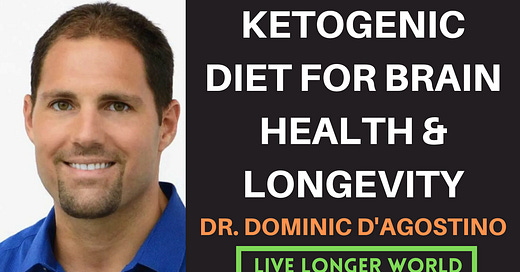Ketogenic Diet for Brain Health & Longevity | Dr. Dominic D'Agostino
Live Longer World Podcast #23
"I actually feel that it's probably not optimal to be on a ketogenic diet all the time. I follow a modified version of it that's very rich in plant-based fiber and things like that. For the average person, there are definitely benefits of intermittent ketosis. I think the advantage of going into ketosis occasionally is that it promotes metabolic flexibility and opens up and really pushes your body to be more fat-adapted over time."Live Longer World Podcast #23 has been released!
My guest today is Dr. Dom D’Agostino who may require no introduction specially in the world of ketogenic diet, but here’s a short one: He is an Associate Professor, College of Medicine Molecular Pharmacology & Physiology at the University of South Florida, with his research focusing on metabolic therapies, ketogenic diets, ketone supplements, and other metabolic based drugs. He is also a research scientist at the Institute of Human and Machine Cognition.
Dom runs the website ketonutrition.org where he educates people on his research on metabolic therapies and ketogenic diets.
This is Part 1 of a 2 part conversation with Dom. He has so much knowledge to share and in this episode we dive into the history of ketogenic diets, keto for brain health and neuroprotective seizures, keto for longevity benefits, weight training, caloric restriction and more. Hope you enjoy the episode!
[If you are a premium subscriber, you can also read the transcript of the episode below]
Best, Aastha
Listen to the Podcast:
Apple Podcasts: here
Spotify:
YouTube:
Google / All Platforms: here
Time Stamps:
0:00 Ketogenic diet is not optimal for everyone
0:56 Dom D’Agostino Intro
1:29 Plant-based ketogenic diet
3:20 Ketogenic diet & brain protection against seizures
16:40 Ketone Esters & Salts
19:29 Does the brain need glucose?
21:37 Intermittent Ketosis & Fasting Mimicking Diet
25:17 Cyclic Ketogenic diet for longevity
28:40 Devices for tracking ketosis
30:30 Ketogenic diet for longevity vs. Caloric restriction
37:50 Keto diet for cancer prevention
41:57 Keto diet, Insulin pathway, and glucose
46:50 Time restricted eating benefits
50:17 Dom vs. Layne Norton on Joe Rogan podcast
51:40 Muscle for longevity (especially for women)
56:10 Support Live Longer World
Support Live Longer World:
If you enjoy my work and wish to support it, consider sharing it with a friend or two, leaving a review on Apple podcasts or signing up as a premium member to help crowdfund transcripts.
And if you are further inclined to show love and support, you can donate on Patreon.
You can also connect with me on Twitter @livelongerword & Instagram @longevityfuture
If you wish to receive updates on future podcasts and posts I release, you can subscribe below.
FIND ALL LIVE LONGER WORLD PODCAST EPISODES:
Website | YouTube | Apple | Spotify | Google | All Platforms
Premium Subscriber Transcript:
Aastha: Hi, Dom and welcome to the Live Longer World podcast.
Dom: Great to be here. Thank you for having me.
Aastha: Firstly, I want to thank you because you are a huge part of the reason I started practicing ketogenic diets myself, and this was about two years ago. Now I do mostly a modified Atkins sort diet, I think similar to what you do, because I incorporate a lot of vegetables, especially crisper's vegetables in my diet, I feel so great.
I absolutely love the diet. I love the brain clarity benefits and just overall energy and lightness. Thank you for spreading the word on it.
Dom: Thank you for listening to, whatever information you heard or read or whatever and advancing the message behind here. A ketogenic diet is not for everybody, but it is important to reduce the amount of sugar and processed carbohydrates that we're consuming. I'm actually a fan of a higher plant-based, higher veggie, incorporating veggies into the diet.
Actually, the first blog that I ever did on keto nutrition, if you go way back, the title of it is Implementing a Plant-based Ketogenic Diet because I get so many questions about that. I personally felt that there were a lot of benefits that people can derive by maybe reducing meat and incorporating more plants in that. Actually, I made that the blog, the first blog that kicked off our website, blog, that was the first blog ever. Way back, it was four or five years ago.
Aastha: That's certainly possible. I'm vegetarian actually, I don't eat any meat, so it's totally possible. We'll dive all into that and a bunch of questions that you get asked on it, but I want to start with just the history of ketogenic diets, because most people may have heard of keto and just the popular diet. It's often synonymous with a weight loss diet, but people don't realize that it actually started, as research for neurodegenerative diseases or for neuroprotective against seizures and epilepsy.
A huge part of your research is focused on that in fact. Maybe you can touch a bit on the connection between ketogenic diets and protecting the brain against neurological disorders.
Dom: Thanks for bringing that. The history is really important. I was in a dietetics program, at Rutgers University for my undergrad and later majored in Bio, too. During my training in nutrition, science, and dietetics, we didn't really talk about the ketogenic diet, just that it was a bad thing to do or to even think about. We didn't talk about its clinical use of it.
We did talk about protein sparing modified fast and how people died from doing this zero carb, high protein diet, which was just basically drinking collagen.
Keep reading with a 7-day free trial
Subscribe to Live Longer World to keep reading this post and get 7 days of free access to the full post archives.




